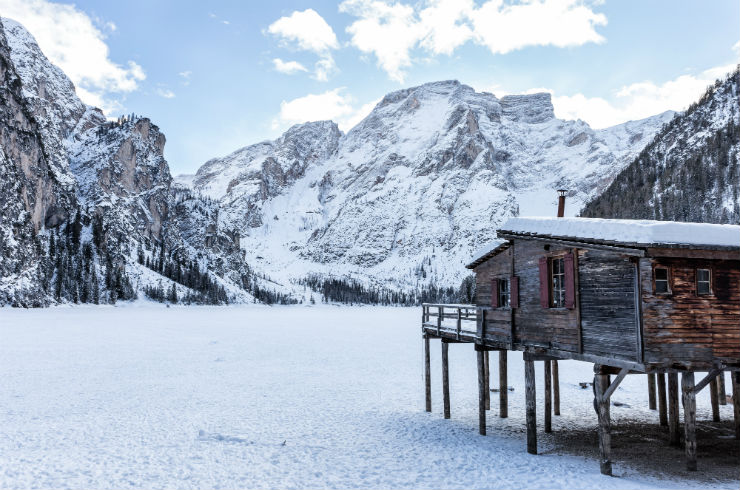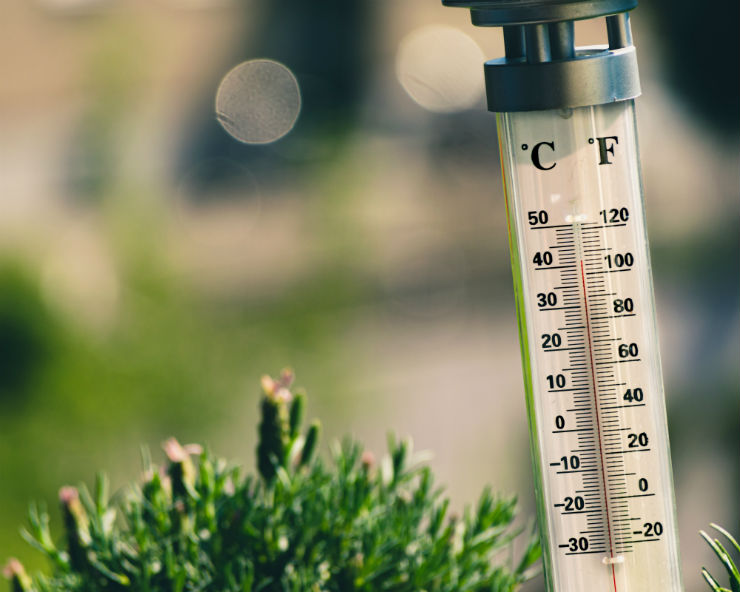Talking about weather in Italian
As you probably know, Italians love having long chats with friends or even with people they meet on the streets. Talking about the weather in Italian, or il tempo, can be a good idea to break the ice when you are going to start a conversation with an Italian person, or just to avoid embarrassing silence.
Sure enough if you are at the bus stop, or waiting in line, or in the elevator it would be very common to say something like:
Fa caldo oggi, eh? – It’s hot today, isn’t it?
Come piove! – It’s raining a lot!
Before going to check the vocabulary and the main expressions to refer to Italian weather, it is interesting to say something about the weather in Italy.
Weather in Italy
Generally, Italian weather is mild in spring and autumn, cold in winter and warm in summer.
However, the climatic conditions can vary from North to South Italy: in most mountain areas of North and South-Central Italy, winters can be cold or even freezing while summers are cool and breezy.
On the contrary, in coast areas, winters are mild, sometimes rainy and windy whereas summers are hot and sweltering.
The hottest Italian cities are usually Bologna, Florence, Milan, Naples, Palermo and Rome, while the coldest cities are Aosta, Bolzano, L’Aquila, Torino and Trento.
Now that you know more about the weather situation in Italy, let’s go to see the different ways to talk about the weather in Italian.
Asking for information about the weather in Italian
The most used expressions to ask for information about weather in Italian are:
Quali sono le previsioni del tempo per oggi / domani / questa settimana?
What’s the weather forecast for today / tomorrow / this week?
Com’è il tempo?
How’s the weather?
Che tempo fa?
What’s the weather like?
Che tempo fa fuori?
What is it like outside?
As you can see, in the last two questions there’s the Italian irregular verb fare (to do) whereas in English we use to be.
Giving information about weather in Italian
In this paragraph, you will learn four options to answer to the question che tempo fa?
Please note that Italians usually use sentences built with the verb fare much more than the other solutions.
Weather in Italian – Fare + adjective
Stamattina fa davvero caldo!
This morning it’s really hot!
Ieri ha fatto molto freddo.
Yesterday it was very cold.
Mi sa che farà cattivo tempo domani.
I think tomorrow’s weather is bad.
Se piovesse, farebbe più fresco.
If it rained, it would be cooler.
Weather in Italian – Essere + adjective
Oggi è soleggiato, per fortuna!
Fortunately, today it is sunny!
In Italia lo scorso inverno è stato davvero piovoso!
In Italy the last winter was really rainy!
Mi auguro non sarà nuvoloso in montagna come l’ultima volta.
I hope it won’t be cloudy in the mountains as it was last time.
Se non fosse così afoso, andrei a fare una corsetta.
If it wasn’t so muggy, I would go for a jog.
Weather in Italian – c’è / ci sono + noun
Ci sono molte nuvole in cielo oggi!
There are a lot of clouds in the sky today!
Potremmo andare a fare una passeggiata. C’è bel tempo oggi!
We might go out for a walk. It’s nice weather today!
C’era un vento forte quando siamo tornati a casa!
There was a gale while we were coming back home!
Se ci sarà la nebbia, temo sarà piuttosto difficile ritornare alla baita.
If there is fog, I fear that it will be pretty hard to come back to the cottage.
Weather in Italian – “weather verbs”
Sta piovendo da ieri mattina!
It has been raining since yesterday morning!
Ieri ha grandinato mentre invece oggi fa caldo… che tempo strano!
Yesterday it hailed. Today it’s warm… what weird weather!
Credo proprio che nevicherà.
I really think it will snow.
Troppo rischioso uscire in questo momento! Potrebbe diluviare da un momento all’altro.
It’s too risky to go out at this moment. It might pour at any moment.
Describing nice weather in Italian

Here are some expressions which can help you to describe a nice and sunny day:
| English | Italian |
| It’s chilly / cool | Fa fresco. |
| It’s clear | È sereno. |
| It’s drizzling | Pioviggina. |
| It’s dry | È secco. |
| It’s good / nice weather | C’è bel tempo. |
| It’s sleeting | Nevischia. |
| It’s sunny | È soleggiato. / C’è il sole. |
| It’s warm | Fa caldo. |
Describing bad weather in Italian

There are now those expressions you need when you want to describe an awful and rainy day:
| English | Italian |
| It’s awful / terrible weather | Fa un tempo orribile. |
| It’s bad / miserable | Fa cattivo tempo. |
| It’s clammy / close / muggy | C’è afa. / è afoso. |
| It’s cloudy | È nuvoloso. |
| It’s cold | Fa freddo. |
| It’s foggy / misty | C’è (la) nebbia. |
| It’s gloomy | È uggioso. |
| It’s hot | Fa caldissimo. |
| It’s humid | È umido. |
| It’s icy / frosty | Fa freddissimo. / Si gela. / C’è il gelo. |
| It’s rainy | È piovoso. |
| It’s stormy | È burrascoso / tempestoso. |
| It’s ugly (weather) | È brutto (tempo) |
| It’s windy | È ventoso. / C’è il vento. |
Weather verbs in Italian
Here are the most common verbs to discuss weather in Italian:
| Italian | English |
| congelare / gelare | to freeze |
| diluviare | to pour |
| grandinare | to hail |
| nevicare | to snow |
| nevischiare | to sleet |
| piovere | to rain |
| piovigginare | to drizzle |
| schiarirsi | to clear up |
| tuonare | to thunder |
Vocabulary for the weather in Italian
Here below we have a list of Italian words you can hear when checking the weather forecast on TV:
| Italian | English |
| Acquazzone | Cloudburst |
| Afa | Mugginess |
| Arcobaleno | Rainbow |
| Brezza | Breeze |
| Brina | Frost |
| Chicco di grandine | Hailstone |
| Diluvio | Downpour |
| Disgelo | Thaw |
| Fanghiglia | Slush / Mud |
| Fiocco di neve | Snowflake |
| Folata di vento | Gust of wind |
| Foschia | Haze |
| Fronte freddo | Cold front |
| Fulmine | Lighting / bolt |
| Ghiaccio | Ice |
| Grandinata | Hailstorm |
| Grandine | Hail |
| Nebbia | Fog |
| Neve | Snow |
| Nevicata | Snow shower |

And even more vocabulary…
| Italian | English |
| Nevischio | Sleet |
| Nube temporalesca | Thundercloud |
| Nuvola | Cloud |
| Ondata di caldo | Heatwave |
| Ondata di freddo | Cold snap |
| Pioggia | Rain |
| Rovescio | Downpour / Shower |
| Rovesci sparsi | Scattered showers |
| Rugiada | Dew |
| Sole | Sun |
| Tempesta | Storm |
| Temporale | Thunderstorm |
| Terremoto | Earthquake |
| Tormenta | Blizzard /Snow storm |
| Tornado | Tornado |
| Tromba d’aria | Whirlwind / Windstorm |
| Tuono | Thunder / Thunderclap |
| Uragano | Hurricane |
| Vento | Wind |
| Vento forte | Gale |
Idioms related to the weather in Italian
Do you know Italians use a lot of idioms related to the weather when they talk to each other? Are you curious to find out which ones are the most popular? Let’s see them together!
|
Italian |
English |
Meaning |
|
Speriamo che il tempo tenga. |
Let’s hope the weather holds out. |
Used when you really hope it won’t rain suddenly. |
|
Piove sempre sul bagnato. |
When it rains, it pours. |
Used when you want to say that good things keep happening to lucky people while bad things to unlucky people. |
|
Il maltempo ci perseguita. |
The bad weather is still with us. |
Ironically used during a rainy day where
it seems that bad weather is following you wherever you are going. |
|
Vedere le stelle |
To see the stars |
Used when you experience a huge physical pain after getting hurt with something. |
|
|
These four expressions are mainly used in informal contexts when you want to describe a strong and heavy rain. |
|
|
Funny expressions used when you state to be extremely happy! |
|
Cielo a pecorelle, pioggia a catinelle. |
Mackerel sky, not twenty-four hours dry. |
According to this famous Italian idiom, conventionally translated with an old and obsolete English saying, if there is a sky with clouds in the shape of little sheep, probably it will rain a lot. |
|
Non ci piove! |
There’s no doubt about it! |
Used when you have no doubt about something, when you know something for sure. |
|
|
These three common idioms are used when you want to express frustration and discomfort caused by excessive heat. |
|
Avere la luna storta. |
To be in a bad mood. |
Used when you are nervous and you get easily angry. |
|
|
These two expressions are used when you say that it is extremely cold out. The reference to the dog in the first idiom is unclear: probably it recalls the image of a dog shivering due to the cold. |
|
Avere la pelle d’oca. |
To get goose bumps. |
Used when you have shivers due to the cold and your skin looks like that of a goose. |
|
Come un fulmine a ciel sereno! |
Like a bolt from the blue. |
Used when it happens something unexpected and almost negative. |
|
Avere un colpo di fulmine. |
Love at first sight! |
Used to say that you fell in love with someone at first sight. |
Celsius vs Fahrenheit

Probably you already know that Italy – as most of the countries in the world! – uses the Celsius scale to measure the temperature. On the contrary, the USA and few other countries opted for the Fahrenheit scale.
To convert Fahrenheit to Celsius, subtract 32 and divide by 1.8.
Example of conversion: 86 degrees Fahrenheit = 30 degrees Celsius.
In addition, I suggest you revise Italian numbers.
Here are some examples which can help you ask for the temperature:
Quanti gradi ci sono oggi?
What’s the temperature today? / How many degrees are there today?
La temperatura è di 30 gradi (Celsius / centigradi). / Ci sono 30 gradi.
The temperature is 30 degrees. / There are 30 degrees.
Please note that the use of the terms Celsius or centigradi (singular: centigrado) is optional when replying.
How and where Italians check the weather forecast
Italians usually search for information about the weather on the main channels of Italian television (for example: Rai 1, Canale 5, Italia1) or on their own mobile phone.
In addition, if you want to have some information about Italian weather on your own mobile phone, you can look at these 5 websites:
- 3B METEO
- IL METEO
- METEO AM (Italy’s Air Force Meteorological Service)
- METEO.IT
- SAT24 (real-time weather forecast)
Conclusion
Sunny, rainy, hot, cold… check the weather and plan your next trip to Italy!
Finally, you can give information about the weather in Italy, use the right words to ask and answer questions about Italian weather, use typical Italian idioms related to the weather in informal contexts, convert Fahrenheit to Celsius and vice versa. Also, you will be able to consult Italian websites where to find the daily weather report.
What else? Now you are ready to start a small talk about weather in Italian!



